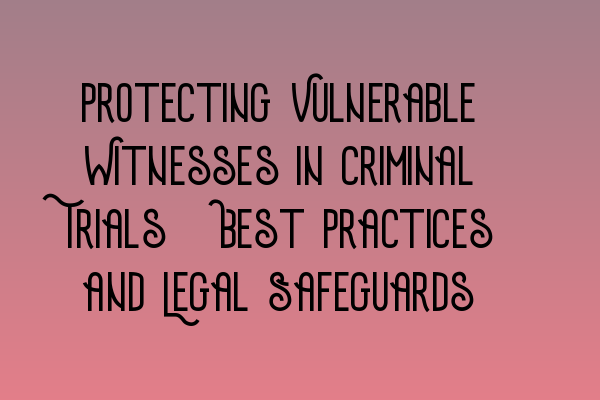Protecting Vulnerable Witnesses in Criminal Trials: Best Practices and Legal Safeguards
Witnesses play a crucial role in criminal trials, providing essential testimony to establish the facts of a case. However, when witnesses are vulnerable, such as children, victims of sexual assault, or individuals with mental health issues, additional measures must be taken to ensure their protection and enable them to give their evidence effectively. In this article, we will explore the best practices and legal safeguards in place to protect vulnerable witnesses in criminal trials.
The Importance of Protecting Vulnerable Witnesses
Vulnerable witnesses may face numerous challenges when giving evidence in criminal trials. They may be intimidated, suffer from trauma, or experience difficulty in communicating their experiences. Protecting vulnerable witnesses not only ensures their well-being but also promotes fairness and justice in the legal system.
1. Anonymity Orders
Anonymity orders are commonly used to protect vulnerable witnesses, particularly in cases involving sexual offenses or organized crime. These orders prohibit the disclosure of the witness’s identity, shielding them from potential retaliation, intimidation, or stigma. Anonymity orders are granted at the court’s discretion, and their duration can vary depending on the circumstances of the case.
2. Special Measures
Special measures are designed to facilitate the testimony of vulnerable witnesses by reducing anxiety and enhancing their ability to give evidence effectively. These measures include:
- LLC Formation Made Simple: Step-by-Step Guide for UK Entrepreneurs: This comprehensive guide will walk you through the process of forming a Limited Liability Company (LLC) in the UK, providing all the necessary steps and information for entrepreneurs.
- Business Regulations in the UK: A Comprehensive Overview: Learn about the various business regulations in the UK and how they impact entrepreneurs and businesses. This article covers everything from licensing requirements to employment laws.
- SQE Workshops and Webinars: Accelerate Your Exam Preparation: If you’re preparing for the Solicitors Qualifying Examination (SQE), attending workshops and webinars can greatly enhance your exam preparation. Find out how to accelerate your learning with specialized SQE workshops.
- Delaware Corporate Law for UK Solicitors: Key Insights and Practices: Gain key insights into Delaware corporate law and understand its relevance for UK solicitors. This article dives into the nuances of Delaware corporate law and provides practical tips for solicitors.
- Demystifying the Solicitors Qualifying Examination Format: Unsure about the format of the Solicitors Qualifying Examination (SQE)? This article demystifies the SQE format, giving you a clear understanding of what to expect and how to prepare.
3. Intermediaries
In cases where vulnerable witnesses have difficulty understanding questions or expressing themselves, the court may appoint an intermediary. Intermediaries are communication specialists who help facilitate effective communication between the witness and the court. They assess the witness’s communication abilities and provide guidance to both the court and the witness throughout the trial, ensuring a fair and accurate exchange of information.
4. Support Persons
Vulnerable witnesses often benefit from having a support person present during their testimony. This support person can be a trusted individual, such as a family member or a professional support worker, who provides emotional support and helps the witness feel safe and secure. Support persons do not interfere with the proceedings but are there solely to support the witness throughout their testimony.
Conclusion
Protecting vulnerable witnesses is of utmost importance in criminal trials. Anonymity orders, special measures, intermediaries, and support persons all contribute to creating a safe and supportive environment where vulnerable witnesses can give their evidence effectively. By implementing these best practices and legal safeguards, our legal system can uphold fairness, justice, and the rights of vulnerable witnesses.
